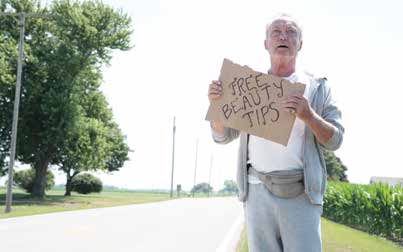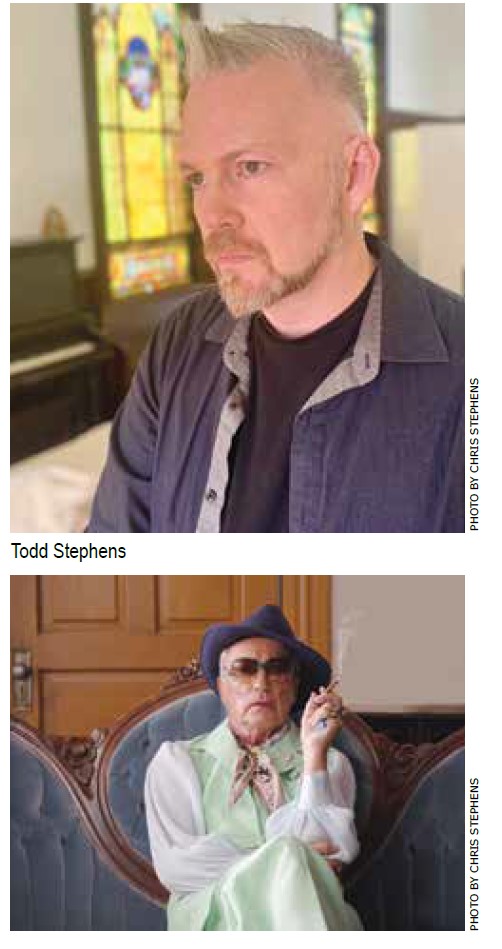
By Gary M. Kramer–
Swan Song, opening August 6, isthe third entry in out gay writer/director Todd Stephens’ “Sandusky” trilogy. It is based on an iconic man Stephens knew in his hometown. Mr. Pat (Udo Kier) is a retired hairdresser asked to style a dead woman (Linda Evans) for her funeral. As he escapes his nursing home and travels across town, Pat encounters various folks—some new, and some he knows—and reflects on his life.
The filmmaker chatted with the San Francisco Bay Times about his new film and his hometown hero.

Gary M. Kramer: Is your film an homage to Mr. Pat, or a biopic?
Todd Stephens: It’s an homage. This actual event never happened. Details from his life made it into the film, but the actual plot wasn’t from his real life.
Gary M. Kramer: Swan Song is the third film in your Sandusky trilogy. Can you discuss the focus of these films and how they interconnect?
Todd Stephens: The trilogy is loose. The connection is that they are films dealing with different parts of the queer experience in a small town—in this case, my hometown.
Gary M. Kramer: Whereas your last Sandusky film Gypsy 83 was a road movie, Swan Song is a road movie that never leaves town. Can you talk about the appeal of this genre and how you came up with the different encounters Mr. Pat has?
Todd Stephens: I just like the frame of a road movie. It’s so American, and such an American cinematic convention. I was very inspired for this film by films like The Straight Story, The Trip to Bountiful, and Nebraska, films that deal with aging and the end of life. The first couple of experiences Mr. Pat has, I wanted to make it clear to the audience that being gay was not a conflict or that he was ridiculed or bullied for being different. I wanted to make a point that he goes into a redneck gas station, and you think that being who he is would have provoked a reaction in somebody like Lyle (Bryant Carroll) [the store clerk]. But I wanted to show how the world has changed. He wants to get a rise out of the guy, but Lyle really doesn’t care. And there was Janine (Catherine Albers), a Christian woman who has conservative values. I wanted to show they connect and have a mutual thing they relate to. The farmer, Josiah (Dave Sorboro) Pat meets when he trips [while walking], was probably the first hot, sexy guy he’d seen in many years.
Gary M. Kramer: Your titles often have musical themes, and Swan Song has a great soundtrack. Can you talk about the use of music in your film(s)?
Todd Stephens: When I start writing a script, it’s like I’m listening to a playlist. The music allows me to come up with the ideas. The only time I ever saw Pat do drag, he did it to Shirley Bassey’s “This Is My Life,” and he loved Dusty Springfield and Judy Garland. Those were Mr. Pat songs, from that era of old school queens.
Gary M. Kramer: Udo Kier is great to watch jumping rope with kids and lip synching to Robyn with a chandelier on his head, but you also utilize Stephanie McVay well in one scene and you feature Linda Evans and Jennifer Coolidge in small roles. What can you say about the actors who play against Udo?
Todd Stephens: 95% of directing is casting the right people and nudging them a little bit here and there and letting them do their thing. I knew they would all be great in the parts. Jennifer Coolidge—half of what she said I didn’t write. That’s her style, and I loved that. She is a master of improv. Stephanie McVay was my mom in Edge of Seventeen, and her character is my mom character here. Stephanie is always playing a different incarnation of my mother. Linda Evans came out of retirement to do the movie. She hasn’t done a film in twenty years. The story just touched her. I felt her character needed to be an actress with gravitas. It’s a small part but a pivotal character. I am glad she did it and I want to work with her again.

Gary M. Kramer: The film is a story about forgiveness. Do you hold grudges?
Todd Stephens: Yes. And part of the reason that I wrote the film was to try to let them go. I have anger at certain people, and it stands in my way. Writing Swan Song was to let go of some resentment I have because you can’t say you’re sorry to someone you’re mad at after they are dead. It’s better to say what you have to say to someone while you’re both alive.
© 2021 Gary M. Kramer
Gary M. Kramer is the author of “Independent Queer Cinema: Reviews and Interviews,” and the co-editor of “Directory of World Cinema: Argentina.” Follow him on Twitter @garymkramer
Published July 29, 2021
Recent Comments